
Tropical Animal Science Journal
Scope & Guideline
Connecting Science and Practice in Animal Welfare
Introduction
Aims and Scopes
- Animal Nutrition and Feed Science:
The journal emphasizes research related to the nutritional requirements of various livestock species, including studies on feed composition, supplementation strategies, and the impact of dietary interventions on growth performance and health. - Genetics and Breeding:
A significant focus on genetic studies, including molecular genetics, SNP analysis, and breeding strategies aimed at improving livestock traits such as productivity, disease resistance, and adaptability to local conditions. - Animal Health and Disease Management:
Research addressing animal health issues, including disease prevention, treatment strategies, and the impact of environmental factors on disease prevalence in tropical settings. - Sustainable Animal Production Systems:
The journal explores sustainable practices in animal production, including the use of alternative feed resources, waste management, and the environmental impacts of livestock farming. - Physiological Responses to Environmental Stressors:
Studies investigating how tropical animals respond to environmental stressors such as heat, humidity, and nutritional challenges, aiming to enhance animal welfare and productivity. - Innovative Technologies in Animal Science:
The journal includes research on novel technologies and methodologies such as nanotechnology, metabolomics, and advanced breeding techniques that can enhance animal production efficiency.
Trending and Emerging
- Alternative Protein Sources:
An increasing number of studies are exploring alternative protein sources for livestock, such as insect meal, seaweed, and plant-based supplements, in response to global protein shortages and sustainability concerns. - Precision Livestock Farming (PLF):
Research into precision livestock farming technologies, including the use of sensors and data analytics to enhance monitoring and management of animal health and productivity, is on the rise. - Climate Adaptation Strategies:
With climate change impacting animal agriculture, there is a growing emphasis on research aimed at developing strategies for adapting livestock systems to changing environmental conditions. - Microbiome Research:
The exploration of the gut microbiome and its influence on animal health, growth performance, and disease resistance is emerging as a significant area of interest. - Holistic and Sustainable Practices:
Studies focusing on holistic approaches to animal management and sustainable practices that consider animal welfare, environmental impact, and economic viability are trending. - Functional Foods and Nutraceuticals in Animal Diets:
Research on the incorporation of functional foods and nutraceuticals in animal diets to improve health and performance outcomes is increasingly prevalent, reflecting a shift towards health-oriented animal production.
Declining or Waning
- Traditional Breeding Practices:
There is a noticeable decrease in publications focusing solely on traditional breeding practices, as the field evolves towards more advanced genetic and genomic techniques. - Chemical Feed Additives:
Research on the use of chemical feed additives, particularly antibiotics, is declining due to increasing regulatory scrutiny and a shift towards natural alternatives. - Conventional Disease Treatment Approaches:
The journal has seen a reduction in studies centered on conventional methods of disease treatment, as there is a growing emphasis on preventive measures, holistic approaches, and alternative therapies. - General Animal Husbandry Practices:
Publications that focus broadly on general animal husbandry practices are waning, giving way to more specialized studies that address specific challenges or innovations in animal science.
Similar Journals
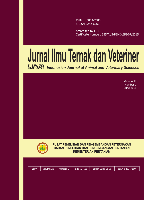
Jurnal Ilmu Ternak dan Veteriner
Advancing animal science through open access research.Jurnal Ilmu Ternak dan Veteriner, published by Pusat Penelitian dan Pengembangan Peternakan, is a leading Open Access journal based in Indonesia that has been providing a platform for groundbreaking research in the fields of animal science and veterinary medicine since its establishment. With its ISSN (0853-7380) and E-ISSN (2252-696X), this journal aims to disseminate high-quality research that addresses critical challenges and innovations in animal husbandry, veterinary practices, and related biological sciences. Recognized within the Q4 category in Animal Science and Zoology and the Q3 category in Veterinary (miscellaneous) as of 2023, it serves as an essential resource for researchers and practitioners looking to stay current with the advancements in these vital fields. The journal's commitment to providing Open Access content since 2011 ensures that cutting-edge findings are readily available to a global audience, fostering collaboration and progress in the animal sciences. With the Scopus ranking reflecting its niche position in the veterinary and agricultural sciences, Jurnal Ilmu Ternak dan Veteriner is poised to make a significant impact through 2024 and beyond.

Applied Animal Science
Innovating Solutions for Animal Well-being and Food SafetyApplied Animal Science, published by Elsevier Science Inc, is an esteemed journal that has quickly made its mark in the fields of Animal Science and Food Science since its inception in 2019. With an ISSN of 2590-2873 and an E-ISSN of 2590-2865, this journal has received commendable recognition, achieving a Q2 ranking in both categories as of 2023. Encompassing a broad scope that integrates cutting-edge research and practical applications, Applied Animal Science seeks to disseminate knowledge that advances the well-being of animal systems and food safety. Researchers and professionals in the agricultural and biological sciences benefit from its high-quality articles, which are ranked #152 out of 490 and #200 out of 389 in their respective fields according to Scopus rankings. While currently not open access, the journal remains accessible to a global audience of scholars eager to explore innovative findings and robust methodologies. As it continues to grow through 2024 and beyond, Applied Animal Science aims to be a pivotal platform for fostering knowledge exchange and inspiring future studies in its domain.

TROPICAL ANIMAL HEALTH AND PRODUCTION
Innovating solutions for vibrant animal health in the tropics.Tropical Animal Health and Production is a prominent academic journal dedicated to advancing the field of animal health and production in tropical environments. Published by Springer, this journal has been a pivotal platform for researchers and professionals since its inception in 1969, serving as a vital resource for innovative studies and advancements up to 2024. With impactful research findings, it holds a respectable Q2 ranking in both Animal Science and Zoology, and Food Animals, demonstrating its significance within these fields. The journal’s commitment to high-quality research is further reflected in its Scopus rankings, with a notable position in Agricultural and Biological Sciences and Veterinary Food Animals. Although it is not an open-access publication, the insights and knowledge shared within its pages are invaluable for those engaged in tackling the challenges of animal health and production in the tropics. Researchers and students will find Tropical Animal Health and Production an essential source for the most recent advancements and practices in veterinary science and animal care for food-producing species.
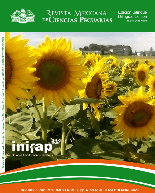
Revista Mexicana de Ciencias Pecuarias
Transforming Veterinary Practices with Cutting-Edge ResearchRevista Mexicana de Ciencias Pecuarias, published by INIFAP-CENID PARASITOLOGIA VETERINARIA, is a prominent open-access journal since 2010 that caters to the fields of Animal Science and Veterinary Medicine. Based in Mexico, this journal addresses critical issues in animal health, production, and welfare, making it instrumental for researchers, professionals, and students seeking to advance their knowledge and practices. With an impact factor that reflects its growing influence, particularly in the Q3 quartile rankings in both Animal Science and Zoology as well as Veterinary (Miscellaneous) categories, the journal provides a vital platform for the dissemination of innovative research and findings. Additionally, its Scopus Ranks position highlights its role in publishing significant contributions to the fields of Veterinary Science and Agricultural Biology. The journal fosters a collaborative learning environment through its open-access model, ensuring that valuable insights are accessible to a wide audience. For those committed to enhancing animal well-being and advancing veterinary practices, the Revista Mexicana de Ciencias Pecuarias stands as a key resource through its rigorous peer-reviewed publication process and commitment to scientific excellence.
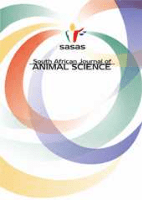
SOUTH AFRICAN JOURNAL OF ANIMAL SCIENCE
Exploring the depths of zoological knowledge.SOUTH AFRICAN JOURNAL OF ANIMAL SCIENCE is a leading scholarly publication dedicated to the dissemination of original research, review articles, and critical insights in the fields of animal science and zoology. Established in 1974, this journal is published by the South African Journal of Animal Sciences and has since become an essential resource for researchers and professionals in the field. The journal, which currently holds a Q3 ranking in Animal Science and Zoology as per Scopus rankings, aims to promote scientific knowledge and innovation in animal husbandry, welfare, nutrition, and breeding practices, with a particular emphasis on the South African context. The journal's rigorous peer-review process ensures high-quality research is shared widely among the academic community. Researchers and students alike will find valuable content and access options that support ongoing education and professional development in this vital area of study. For more information, interested readers can contact the editorial office at PO Box 13884, Hatfield 0028, South Africa.
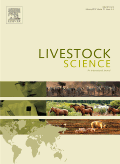
Livestock Science
Empowering the Livestock Community with Cutting-Edge ResearchLivestock Science is a prestigious academic journal published by ELSEVIER, dedicated to the comprehensive study of animal science and veterinary medicine. With an esteemed Q1 ranking in both the fields of Animal Science and Zoology, as well as Veterinary (miscellaneous) in 2023, this journal is recognized for its impactful contributions to the understanding of livestock health, production, and management. The journal has consistently earned its high position within Scopus, ranking 26th out of 194 in General Veterinary and 86th out of 490 in Animal Science and Zoology, reflecting its significant influence within the research community. The open access policy allows for broader dissemination of knowledge, promoting collaboration among researchers, professionals, and students alike. With its continuous publication cycle from 2006 to 2024, Livestock Science remains an essential resource for anyone interested in the advancements, challenges, and innovations within the field of livestock management and veterinary practices.

Translational Animal Science
Fostering Knowledge Exchange in Animal ResearchTranslational Animal Science, published by Oxford University Press Inc, stands as a prominent journal in the fields of Animal Science and Zoology as well as Veterinary Sciences, achieving a commendable Q2 ranking in both categories for 2023. With an E-ISSN of 2573-2102 and transitioning to an Open Access model since 2017, this journal fosters accessibility and dissemination of vital research that bridges the gap between basic animal science and its practical applications. The journal's significant impact factor, where it ranks in the 71st and 65th percentiles respectively for Veterinary and Agricultural and Biological Sciences disciplines, highlights its importance as a resource for emerging trends and innovations in animal research. With submissions accepted until 2024, Translational Animal Science not only contributes to advancing knowledge but also aims to engage a broad audience of researchers, professionals, and students dedicated to improving animal health and welfare. Based in India, the journal serves as an essential platform for the exchange of scientific ideas that facilitate progress within these vital fields.

Animal Nutrition
Unlocking the Secrets of Nutritional Science for AnimalsAnimal Nutrition is a premier open-access journal dedicated to advancing the understanding of nutritional science in animals, published by KEAI PUBLISHING LTD. Established in 2015, this journal has quickly risen to prominence within its field, securing a Q1 ranking in both Animal Science and Zoology and Food Animals as of 2023. With an impressive Scopus ranking, positioned first among 39 journals in Veterinary Food Animals and tenth among 490 in Agricultural and Biological Sciences - Animal Science and Zoology, it remains a critical resource for researchers, professionals, and students alike. The journal's commitment to open access ensures that cutting-edge research is readily available to a global audience, fostering the dissemination of knowledge that drives innovation in animal nutrition and health. With a focus on the intersection of animal physiology, dietary interventions, and food production systems, Animal Nutrition plays a pivotal role in shaping sustainable practices and improving animal welfare worldwide.
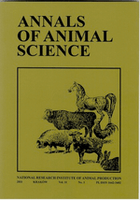
Annals of Animal Science
Cultivating a Global Community of Animal ScientistsAnnals of Animal Science is a prestigious academic journal, published by Walter de Gruyter GmbH in Germany, specializing in the multifaceted field of Animal Science. With an ISSN of 1642-3402 and an E-ISSN of 2300-8733, this journal is recognized for its high-impact contributions, holding a commendable impact factor that demonstrates its relevance in nurturing quality research. The journal has garnered Q2 rankings in 2023 across various categories including Animal Science and Zoology, Food Animals, and Small Animals. Notably, its Scopus Rankings indicate an elite standing, with the journal placing in the top 10% within its specific fields. Covering converged years from 2008 to 2024, the Annals of Animal Science serves as an essential platform for researchers, professionals, and students to disseminate knowledge and advance studies related to animal health, welfare, and production. The journal also emphasizes open access, promoting broader accessibility to foster collaboration and innovation in Animal Science globally. For those committed to advancing their understanding of veterinary and agricultural sciences, this journal is a vital resource.

Revista MVZ Cordoba
Championing contemporary issues in Animal Science and Veterinary Medicine.Revista MVZ Cordoba, an esteemed publication of UNIV CORDOBA, is a pivotal resource for researchers and practitioners in the fields of Animal Science, Zoology, and Veterinary Medicine. Established as an Open Access journal since 2000, it facilitates widespread accessibility of scholarly articles from Colombia, fostering global collaboration and knowledge dissemination. The journal has demonstrated its commitment to quality, holding Q4 quartile rankings in 2023 across various categories including Animal Science and Zoology, and Aquatic Science. Despite its current challenges in rankings, with percentiles in the lower brackets, it represents an important platform for the advancements in these disciplines, specifically catering to emerging research and insights. The journal's annual publication cycle from 2008 to 2024 ensures that it remains timely and relevant in covering contemporary issues within veterinary science and related areas. For researchers, professionals, and students, Revista MVZ Cordoba stands out as a valuable avenue for the exploration of veterinary sciences within a diverse academic landscape.